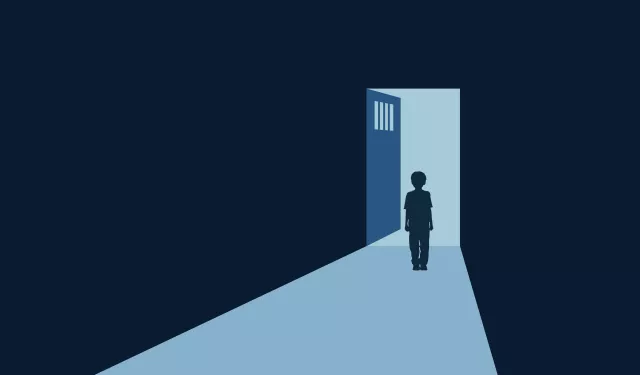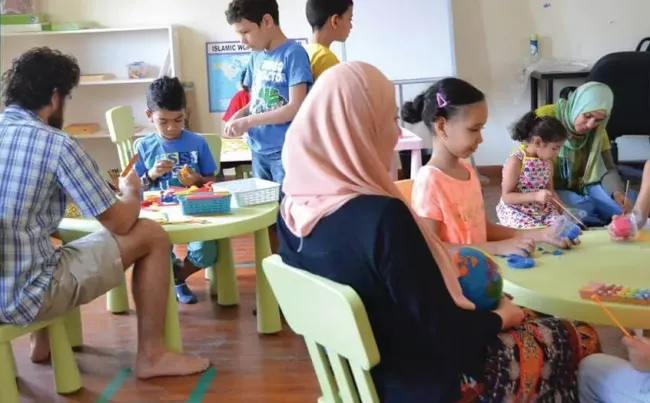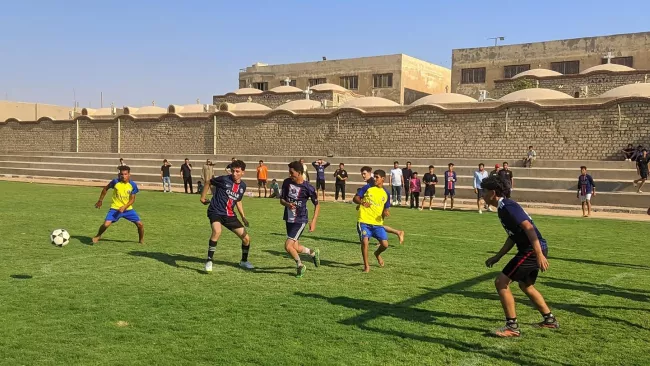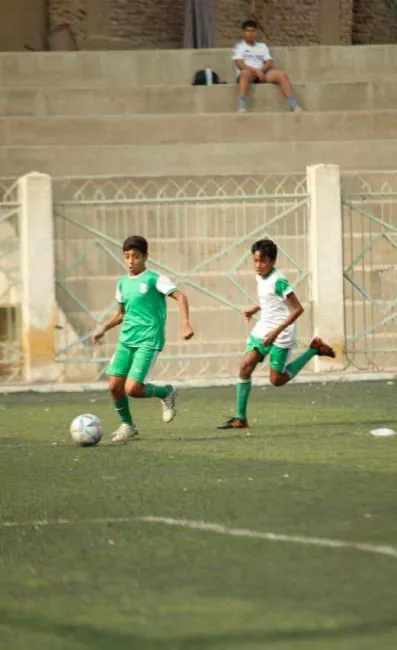
Citizenship during summer holidays
Mosques and churches as spaces for children
For Anas, 12, and his younger brothers Hamza and Mahmoud, both 9, summer brings no real chance to interact with children of other faiths. Enrolled in an Azharite school, they spend the school year surrounded by Muslim classmates. Then, their summer is shaped by the mosque and a camp, whose participants are carefully chosen by Anas’ parents to ensure, as their mother Shaimaa Saleh put it, “they’re raised like us, and we know their families.”
Three years ago, Shaimaa, 35, a homemaker and mother of twin preschoolers in addition to the older three, agreed to her husband’s idea of organizing gatherings “so the children could become friends.”
Over time, these gatherings grew into what she now calls “a camp where the boys meet twice a week at a mosque.” Adults guide them through Quranic lessons—meanings of verses, reasons behind revelations—or teach them behavioral values. Other times, they play PlayStation, rent a soccer field, or take trips to Qanater. Sleepovers, once part of the program, have since been dropped.
“We’re families with similar values and upbringing. Instead of letting our kids befriend children we don’t know, we make sure they have friends we can trust,” Shaimaa said.
Beyond the camp, she invests in Quran memorization lessons. “They study at a nearby mosque for 70 Egyptian pounds ($1.5) each, and I also bring a female tutor to the house to review what they’ve learned at school.”
Choosing separation
Beyond the mosque and camp, Shaimaa’s children have few other spaces. They do not belong to a social club. Their only exposure to children of different backgrounds comes through swimming lessons.
By contrast, Irene Metry, a Christian doctor and mother of 14-year-old twins, relies almost entirely on her church to organize her children’s summers.
Living in Alexandria, Irene and her family attend church year-round, with participation intensifying in summer during the Coptic Saint Mark Festival. This annual nationwide event pits churches against each other in 12 fields, including scriptural memorization, research, the Coptic language, and competitions in literature, sports, arts, and tech.
Irene, 44, is grateful for the wide range of activities the festival offers, which lifts a huge burden from mothers. “The kids wake up early, stay productive, and build friendships and good experiences,” she said.
Her twins are competing this year at the middle school level in both academic and Coptic language competitions. Her son also plays chess, while her daughter competes in handball, art, and theater.
Irene herself grew up with the festival. “I competed in drawing and research in high school. I won first place in Alexandria for research, but not for drawing. Later, I rejoined in college.”
Today, Irene is a volunteer organizer. “I’m responsible for the high school division at our church. It’s volunteer work because the Bible teaches us, ‘Freely you have received; freely give.’”
She rarely looks outside the church for activities. “Only basketball—I wish it were available, so my son could join.”
Irene’s children spend the summer with their peers in church, just as Shaimaa’s children remain in Muslim company at mosque-based spaces.
With the new school year starting Sept. 20, a question arises. How will these children reconnect with classmates after such separate summers? How will they approach the Ministry of Education’s citizenship curriculum, introduced in 2020 to teach acceptance of difference?
Who bears responsibility?
“Fear of the other and isolation.” That’s how Ishak Ibrahim, who leads the Equality and Anti-Discrimination program at the Egyptian Initiative for Personal Rights (EIPR), described the outcome for children returning from these religiously defined summers. But he doesn’t blame mosques, churches, or families. The problem, he said, lies in the absence of cultural centers and youth clubs, which should offer safe, inclusive spaces for all.
“Families are turning to religious institutions because they meet a real need,” he said. For Christian families, the issue goes beyond access to activities. “It’s about finding a safe space free from bullying and discrimination.”
Ibrahim dates this reliance back to the 1970s and 1980s, when the rise of political Islam coincided with the disappearance of public spaces for children. “Christian families began gathering at church, and gradually the church expanded its role. Activities now run year-round, peaking in summer with Sunday School, trips, and sports. These spaces provided safety, but also deepened isolation.”
In recent years, he said, mosques have begun to replicate this model. “They’ve started offering regular religion lessons for children. It’s still in its early stages, and it’s not yet clear how significant it will become.”
Since 2022, the Ministry of Religious Endowments has run a nationwide summer program in mosques. One of its stated aims was to protect children from extremist ideologies.
The current program, launched May 5 and running through Sept. 30, is held in 22,000 mosques nationwide. Sessions are scheduled on Monday and Wednesday afternoons and include understanding and memorizing the Quran, explanation of prophetic traditions, and connections between science and Quranic verses, according to Osama Raslan, ministry spokesperson.
However, EIPR researcher Ibrahim insists that the solution is not to tell mosques or churches to stop. “If cultural centers, youth clubs, and schools brought back summer programs, families would come,” he explained. “If a village has a civic institution offering activities, pressure on mosques and churches will decrease. Sure, some families will still go to religious spaces, but not all.”
Ibrahim believes the key is consistency and safety. “It can’t be a one-off program. Families need to trust it. Christian families, in particular, need safe spaces before they’ll step outside church walls. It’s not impossible, but it will take time.”
Imposed isolation
Though it might seem Shaimaa opted to restrict her children to mosque-based activities, her words reveal something else; limited options.
She longs for affordable alternatives. “I wish there were handwriting or computer courses. These are weak points at school, and they don’t get enough practice.”
She lives in Shubra Al-Kheima, just 10 minutes by public transport from both a library and a cultural center. But cost, not distance, is the issue. “Courses at the library cost 300 to 400 pounds, and I have to multiply that by three for my kids,” she said. Her preschool twins, she added, “don’t need activities yet.”
Seeking alternatives
Some families do seek activities outside religious institutions, but often at a steep price.
Asmaa Ramadan, 33, mother of Seif, 12, and Tamim, 9, lives in 6 October City. “I bend over backwards to find activities for them,” she said.
Her challenge isn’t just money; it’s also time. Twice a week, she commutes downtown: for a youth reading club hosted by a private publisher, which costs 400 pounds per child, and for her older child’s programming course at 2,500 pounds. “I drop them off, wait, and bring them back.”
Another mother, Asmaa Helmy, refuses to send her 9-year-old daughter to mosque-based activities. “I don’t know how they’ll teach her religion,” she said. Instead, she hires a Quran tutor at home and takes her daughter to the Misr Public Library in Amiriya.
She considers herself lucky to live nearby—just 15 minutes by tuk-tuk—and appreciates the affordable programs. “I signed her up for drawing and math courses that cost 60 to 70% of private alternatives.” But she doubts their quality every time she checks the moms’ group at her daughter’s convent school.
“Mothers are always asking who’s going on the church trip or joining the church course,” she explained. “And they pay a third of what I pay at the library.” She wants civil institutions to offer the same quality and affordability as church programs.
Still, her daughter will return to school this fall alongside peers who spent their summer in church activities.
She doesn’t worry. “Maybe because it’s a convent school, they really emphasize acceptance and equality, especially at the start of the year.”
But for children like those of Shaimaa or Irene, who will bridge that gap? Who will teach them how to coexist?



